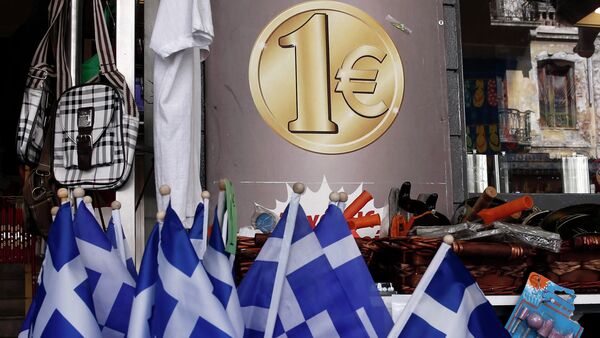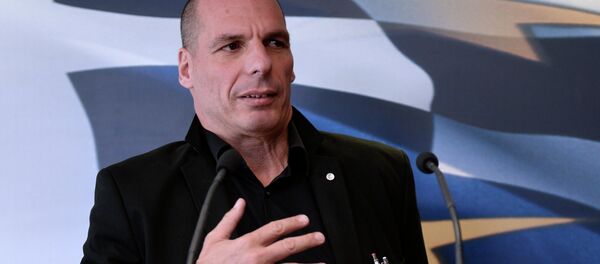With proposed reforms to Greece's bailout conditions — which would unlock more funds for the country — unlikely to be agreed upon during today's talks, there are fears Athens may run out of money and default on some debt payments, particularly with an $837 million (€750 million) instalment to the International Monetary Fund (IMF) due on Tuesday.
The talk from Greek officials, Eurozone finance ministers and European creditors has suggested that while some progress is being made during negotiations, a deal on agreeing to changes to Greece's current debt repayment plan — and therefore unlocking more financial aid — is still some way off.
Doorstep #Eurogroup at around 14.45.
— Jeroen Dijsselbloem (@J_Dijsselbloem) May 11, 2015
Eurogroup President Jeroen Dijsselbloem said Monday's meeting "won't be decisive," while French finance minister Michel Sapin said the "complex and delicate process" might take a "few more days and weeks" to reach an agreement.
'Sensitive Stage' and Fighting Talk
The tense nature of the Athens' debt situation has been reflected in some of the comments coming from both sides of the debate.
Nikos Filis, parliamentary spokesman for Greece's ruling Syriza party has criticized European creditors for the manner in which they have handled negotiations with Athens, telling Greece's Mega TV:
"We are at a very sensitive stage of the negotiations. Lenders have toughened [their stance]. They have put issues on the table that had been closed previously during negotiations, perhaps because they think they can pressure us like they did in the past."
There have also been reported suggestions that the Greek government may purposely default on Tuesday's IMF loan payment if they aren't satisfied with the outcome of today's meeting.
"Is the IMF lending the Eurozone €7.2b so that Greece can repay the IMF €7b so that we can all share Greece's debts? It's all Greek to me!"
— Keith Collins (@inner_coach) May 2, 2015
While on the other side, Germany's finance minister Wolfgang Schaeuble has urged Athens to be cautious and meet the demands of creditors in order to avoid an economic collapse, saying that "experience in other parts of the world has shown that a country can suddenly slide into bankruptcy".
Conflicting Demands Stalling Talks
Greek officials have also criticized what they believe to be the conflicting demands being imposed on the country by creditors of the Eurozone and IMF.
While IMF officials are thought to be opposed to negotiating proposed reforms on Greek labor and pension issues, it's understood that they may be open to reaching some form of agreement on the country's primary surplus, and perhaps even writing off some of Athens' debt.
However, conversely, the Eurozone — which owns the majority of the Greek debt — is thought to be vehemently against the idea of slashing it and negotiating changes to the country's primary surplus, but open to labor and pension reforms.
So, as a result of the contradiction, many analysts have suggested that securing a deal may be almost impossible unless one party folds to the demands of the other.
What Next for Athens — Bow to Demands or Backtrack on Promises?
With the various conflicting points of view and demands combined with the acute nature of Greece's debt problems, many analysts have pointed out that Alexis Tsipras' government in Athens faces some tough decisions that could significantly alter Greece's future.
USD is pushing higher as Greece is the focus for continental Europe. Repayment to IMF due tomorrow. #EURUSD pic.twitter.com/E9A3WZzami
— First Rate FX (@firstratefx) May 11, 2015
If the government is unwilling to accept the terms of the Eurozone, European Central Bank and IMF, and a deal can't be agreed upon, it has been suggested that Greece may have to default on its payments to creditors, further heightening the risk of an exit from the euro.
Alternatively, if Greece does bow to the demands of its creditors, known as the "troika" then the government will be seen as breaking its promise to the Greek people. The Syriza party was elected pledging to renegotiate Athens' debt agreement and end austerity measures which they argue have had devastating impacts on the country's economy.
Whatever the outcome of these ongoing negotiations, they are sure to have a profound impact on Greece's future, with increasing fears of a Grexit from the Eurozone.





